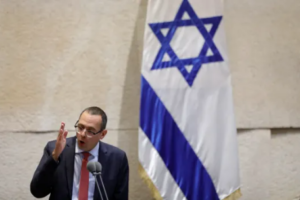Israeli legislator invokes nation-state law in bid to block Palestinian family unification

Zvi Hauser, then of Kahol Lavan, speaking in the Knesset,
The head of the Knesset Foreign Affairs and Defense Committee has cited the so-called nation-state law to call on the government to bar Palestinians from moving to Israel to be united with relatives.
The attempt Tuesday by committee chief Zvi Hauser is the first of its kind to rely on the 2018 Basic Law on Israel as the Nation-State of the Jewish People. Up to now, family-unifications have been declined only based on security considerations.
Hauser and Yoaz Hendel make up the two-man Derech Eretz caucus in the Knesset; they are part of the governing coalition and split off from Benny Gantz’s Kahol Lavan.
By a 41-13 margin overnight Monday into Tuesday, the Knesset voted to extend application of the Citizenship and Entry into Israel Law by a year to bar some Palestinians from moving to Israel to live with relatives.
The controversial nation-state law, a Basic Law that has constitutional status, is being challenged at the Supreme Court. In addition to designating the symbols of the state, it defines Israel as the nation-state of the Jewish people and stipulates that the Jewish people alone, as a people, has the right to self-determination in Israel.
In the debate on extending the ban for another year, Hauser called on the cabinet to state its position on “the change of the constitutional situation with the passage of the nation-state Basic Law as it relates to citizenship and entry into Israel.”

Hauser, who helped get the nation-state law passed even before he was elected to the Knesset, said this law was “not a dead letter on the Israeli statute books” and had “changed the constitutional reality in Israel.”
He added: “Israel has been in an ethnic conflict with the Palestinian people since it was established. It will continue to be demanded that Israel grant citizenship cumulatively to tens of thousands of people with a basic hostile connection to the state, especially to the idea enshrined in its constitution as the nation-state of the Jewish people.
“This demand knowingly undermines another fundamental principle of the Israeli constitution as enshrined recently in the nation-state law. In this state of affairs, not only is Israel entitled to enact a law preventing the entry of subjects of a hostile entity that’s in a bloody conflict with it, it’s an obligation.”
On a case-by-case basis the legislation, which each year is subject to renewal, lets the government withhold legal status in Israel to Palestinians married to Israelis or who have first-degree relatives in the country. The law, which also applies to residents of Iran, Lebanon, Syria and Iraq, was passed in 2003 and has been renewed every year by the Knesset.
Before the matter to be addressed at the Foreign Affairs and Defense Committee this week, legal advisers to the panel expressed reservations about the arrangement. “It is our position that, after 17 years, there are grounds for reexamining the mechanism through which this order is extended and to consider replacing it with the common mechanism of replacing temporary legislation with regular legislation,” the advisers wrote.
This would permit changes to the legislation rather than simply deciding whether the provision should be extended for another year, the advisers said.
The nation-state law gives constitutional status to provisions, some of which were already contained in existing legislation. It declares Hebrew Israel’s only official language, though it gives special status to Arabic and states that, in practice, the law will not detract from Arabic’s previous status as an official language.

At the committee hearing on extension for another year, the Shin Bet security service aimed to show a need for the extension. According to the Shin Bet, no one who has been allowed family reunification since the beginning of 2018 has helped plan or carry out a terrorist attack, but several of their descendants have; the agency deems six people as “assailants,” five as “involved” and three as “accomplices.”
The numbers are based in part on criminal convictions and in part on indictments and do not specify the terrorist activity. The Shin Bet says family unification leads to “increased potential” for involvement in terrorism due to a descendant’s freedom of movement within Israel.
A Shin Bet official said terrorist groups realize this and consider such descendants potential recruits. He said children of people allowed to live in Israel based on family unification “are involved in terrorism to an even greater extent than their parents.”
According to Interior Ministry data provided to the committee, over the past decade, 800 family unification requests a year on average have been submitted, though for each of the past two years, that figure has risen to 1,000.
Officials from the ministry’s Population and Immigration Authority told the committee that, since the temporary legislation was passed in 2003, some 22,000 requests have been considered, not including people disqualified on the grounds of a security-related or criminal record, or because of bigamy or because the center of the family’s life was not in Israel.
Some 50 to 60 percent of applications have been approved, resulting in resident status for 9,200 people and temporary permits for 3,600.
A Labor Party legislator and member of the opposition, Merav Michaeli, has submitted 20 bills designed to replace the temporary legislation but has not won government support.
“The reality is that since 2007, the law hasn’t been amended, even if relief has been given in granting permits following judicial review,” she told the committee. “The reality is that we’ve been going through this controversy every year.”
This article is published in its entirety.
